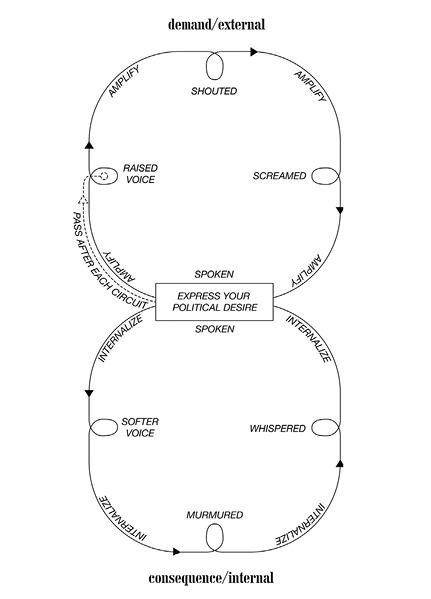
AN EXERCISE FOR DEMOCRATIC UNDEMOCRACY
first performed on November 3, 2016
Sunview Luncheonette, Brooklyn, NY
performed once in 2016
BEN DUVALL
Greg Mihalko, Dhira Rauch, Julia Meeks, Kelsa Trom, Ian Thomas, Kate Scally, Phil DiBello, Sen-I Yu, David Chang, Cameron Blaylock
Brooklyn, NY
810585251b810585251e810585251n810585251d810585251u810585251v810585251a810585251l810585251l81058525118105852510810585251@810585251g810585251m810585251a810585251i810585251l810585251.810585251c810585251o810585251m
bduvall.com
AN EXERCISE FOR DEMOCRATIC UNDEMOCRACY
BEN DUVALL
“An Exercise for Democratic Undemocracy” consisted of three distinct movements. The first was a potluck in which participants were asked to source their dishes locally from their places of residence or work. This instruction, generic and open to interpretation, gave the participant an opportunity to explore the politics of food in their area—the different cuisines and cultures that exist, the kinds of markets, the availability of fresh produce, the local vs. the imported. All of these provocations ask the essential question of politics: who gets what, where, and when? By sharing these dishes with each other, we began to walk each others’ neighborhoods (and, by extension, electoral districts) by proxy.
The second movement comprised a reading of ten speculative proposals for “undemocratic democracies.” These are proposed solutions to problems we currently face, but also potential dystopias. Their form is based on Italo Calvino’s Invisible Cities, in which Marco Polo describes the cities he has witnessed along his journey in the court of Kublai Khan. Calvino’s cities exist as the imagined potential of an architecture, urban planning, or culture that more closely reflects the physical and psychic desires of a populace—they are the conjuring of an imagination that is not bound by the what-has-been-done. In the same way, our imaginings of democracy have largely dead-ended at our current representative system, when the reality is that never before have we had more capacity to inject chance, equality, proportionality and direct action into governance. Speculation can reanimate what has long been dormant or thought unreasonable in our discourse.
The last movement was an exercise for participation. This time, the focus was on using the voice, both for external demand-making, and as an internal realization of the consequences of those demands. Each participant made a vocal demand, which was then repeated first more loudly, and second more softly, by all other participants. The aim is to make ourselves not the ideal voter—for democracy does not begin or end at that—but to make us both vocal and empathetic, capable of taking action but also sensitive to the needs of others. The nature of democratic action is collective, and collective action requires us to feel the pulse of the body politic.